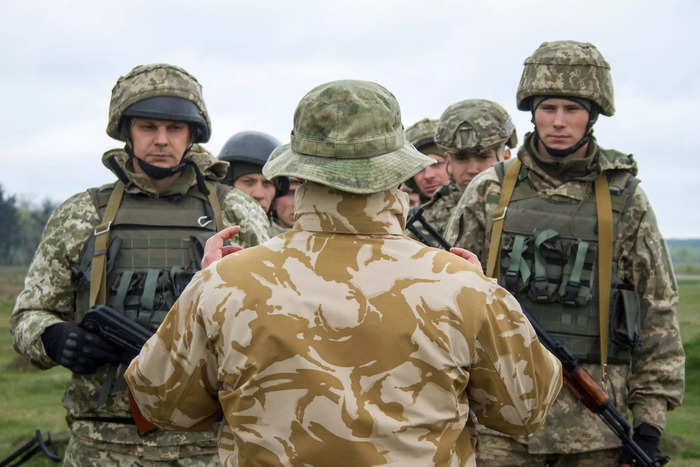Alia ShoaibAug

Ukrainian troops trained by NATO are being left underprepared for the realities of the war with Russia, a report says.
Western training is often limited because instructors have never fought a war like the Russia's invasion of Ukraine, media platform openDemocracy reported.
"I don't want to say anything against our partners, but they don't quite understand our situation and how we are fighting," a senior intelligence sergeant in the 41st Mechanised Brigade, who goes by the name "Dutchman," told openDemocracy.
About 63,000 Ukrainian troops have been trained in the West — mostly in the UK and Germany, per the report.
All of them go through a 35-day "crash course" of basic soldier training, a UK source told the outlet.
Nick Reynolds, a land warfare expert at the UK-based defense think tank the Royal United Services Institute (RUSI), said that the training provided by the West was safer but less comparable to actual warfare.
"We do have a lot of health and safety regulation. Yet this means they are going on to the battlefield less prepared," Reynolds told openDemocracy.
"Dutchman" said that while NATO training can be useful for things like shooting and learning to use equipment, most major combat training occurred in Ukraine.
One limitation is that Western armies have been focused on fighting insurgencies in the Middle East in recent years.
Members of Ukraine's 41st Brigade said that NATO instructors often used examples from the conflict in the Middle East, which largely involved clearing houses and identifying insurgents among the locals, which they said was "not really relevant to us."

"Dutchman" said that Western instructors have experience in urban warfare, fighting in cities and towns — but in Ukraine, much of the fighting is on flat ground.
"We need people to understand how to effectively clear trenches, enter them, how to throw grenades effectively, how not to trip on booby traps, to understand what grenades the [Russians] throw — essentially to understand the enemy," he said.
Western instructors also typically planned "with a weaker enemy in mind," Dutchman said, as NATO forces sought to overwhelm their enemies with the type of firepower that Ukraine does not possess.
Another limitation is that NATO health and safety regulations require troops to undergo basic training before moving on to more advanced levels.
But due to time constraints, Ukrainian troops often don't reach those levels, Reynolds said.
"From a legal, regulatory, safety, and permissions perspective, we can't do [the type of training Ukrainians want] unless we make some fairly serious policy changes," he said.
One significant upside of the Western training is that Ukrainian troops take home expensive equipment, including body armor and medical supplies, a source involved in the UK training process told openDemocracy.
No comments:
Post a Comment